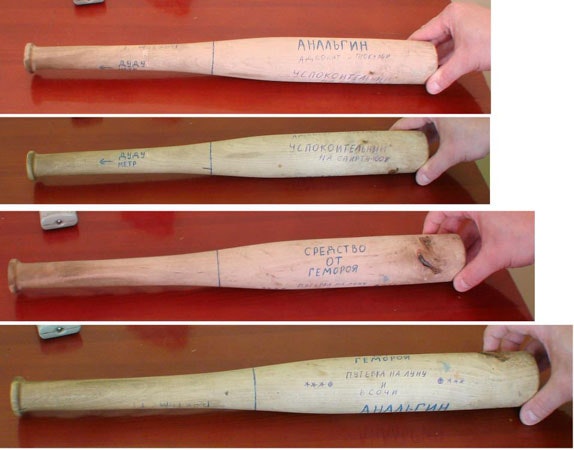A Baseball Bat, but No Game: Abuse in Russian Prison Hospitals
By Tatyana Margolin

A short, blunt baseball bat sat in the staff office of a Russian prison hospital in Nizhnekamsk. It bore the words, “tranquilizer,” “Anal’gin” (an Aspirin-like drug), “Attorney”, and “Medicine for hemorrhoids.”
But, baseball is not a popular sport in Russia.
When officials from a Russian human rights group's public monitoring board discovered the bat during a routine inspection, they immediately suspected that it had been used to torture detainees when they had dared to request the items inscribed on it.
When questioned about the bat, the Russian Federal Corrections Services (FCS) responded that the “wooden stick, approximately 40 cm in length” was found during a routine search of the wood-processing unit of the industrial zone and was brought to the office as part of a list of confiscated objects. The statement went on to express outrage that Agora – the Russian human rights group – was attempting to “influence public opinion and discredit the FCS” through allegations of torture. The prison destroyed the bat, burning it the following day.
Russian officials have a history of detainee abuse. From the internationally infamous case of Sergey Magnitsky, an anti-corruption lawyer who died in pretrial detention from medical neglect in 2009, to the 2012 case of a man who died after police beat and raped him with a champagne bottle, it’s clear that the abuse of detainees remains unchecked in Russia’s prison settings.
But the discovery of an instrument of torture within a prison hospital draws a clear link between this systemic detainee abuse and the extreme lack of access to health services in Russia’s detention centers. Prison hospitals and treatment centers like the one in Nizhnekamsk are typically underfunded and lack even the most basic medical supplies and personnel. It’s rumored that the Russian government spends half as much on prisoner’s healthcare as they do civilians’. The situation is replicated across the country, and is even worse in pretrial detention settings – where health services are almost never available, and detainees can linger in dirty, overcrowded centers for months. An Open Society Foundation (OSF) study has shown that pre-trial detention is actually a cause of disease, exposing people to health risks and depriving them of desperately needed care. The situation in Russia can be so bad that innocent people may plead guilty just to be transferred to prisons where conditions and access to health may be slightly better.
So, what’s the solution? Measures to get sick people out of penitentiary settings, supported by OSF in multiple countries, is one vital step. For those detained, the monitoring of detention settings by independent boards is vital. Prison monitors, like the ones who found the bat in Nizhnekamsk, can uncover cases of abuse and torture, and help to increase detainees’ access to health care services. OSF recently created a new framework for monitoring health in pretrial detention settings, which describes health problems specific to the context of pretrial detention settings and suggests sample questions that prison monitors should ask. It also provides clues that monitors can use to determine the delivery of important health services. This framework will be adapted and piloted shortly in in three countries—Ukraine, Armenia, and Russia—taking an important first step to ensuring access to health services, preventing human rights abuses.

Until November 2021, Tatyana Margolin was regional director for the Open Society Eurasia Program.


